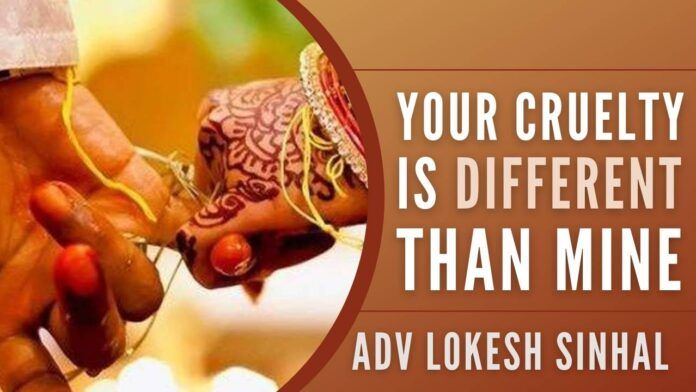
Cruelty: Stretched in multiple dimensions by courts
The irony of marriage in India is that it takes a meeting or two to enter wedlock and years to get out of it when it ought to have been the reverse. The rise in divorce cases can be attributed to this and often the courts have found them in a legal quandary to render the remedy which the facts demand, but the law doesn’t provide. In a judgment last week, stretching the expanse of ground of cruelty provided under section 13(1) (ia) of Hindu Marriage Act, Kerala High Court held, “A husband’s licentious disposition disregarding the autonomy of the wife is a marital rape, albeit such conduct cannot be penalized, it falls in the frame of physical and mental cruelty[1].”
Cruelty is not defined in the Act and the law on this has been evolved through judicial pronouncements. In July 2019, Delhi High Court had dismissed a petition seeking direction to the Centre to declare marital rape as a ground of divorce, saying that it is the legislature’s domain[2]. Two years later, the Kerala High Court has filled this legislative vacuum by bringing the issue of consent in marital sex. The Division Bench of Kerala High Court held, “Merely for the reason that the law does not recognize marital rape under penal law, it does not inhibit the court from recognizing the same as a form of cruelty to grant a divorce. We, therefore, are of the view that marital rape is a good ground to claim divorce[3].”
This was in 1973 when the ground of cruelty was not even available in the law of India, but faced with the challenge to render justice, the court relied upon English Law to grant divorce holding that refusal to sexual intercourse amounts to cruelty.
The ground of cruelty provided under section 13(1)(ia) of The Hindu Marriage Act was added in 1976 and since then the ground has been stretched in multiple dimensions by the courts to deal with the complexities of human behaviour.
While the Kerala High Court judgment implies that conjugal intercourse without consent is cruelty, Delhi High Court in Rajiv Chadha Vs Shama Kapoor (2012) said “willful denial of sexual intercourse constitutes mental cruelty”[4]. Interestingly both the Kerala High Court and Delhi High Court relied upon the Supreme Court judgment in Samar Ghosh Vs Jaya Ghosh (2007) to bring the conduct complained of within the ‘cruel’ act for the purpose of Section 13(1)(ia) of the Act[5]. Delhi High Court in the above case held “the conduct complained of by the respondent-wife was the refusal of the appellant-husband to have sexual intercourse with her. It is to be borne in mind that a normal and healthy sexual relationship is one of the basic ingredients of a happy and harmonious marriage.” It relied upon its own landmark judgment in Rita Nijhawan Vs Balakishan Nijhawan (1973) where it was held: “Thus the law is well settled that if either of the parties to a marriage being a healthy physical capacity refuses to have sexual intercourse the same would amount to cruelty entitling the other party to a decree[6]. In our opinion it would not make any difference in law whether denial of the sexual weakness of the respondent disabling him from having a sexual union with the appellant or it is because of any willful refusal by the respondent; any willful refusal by the respondent; this is because in either case, the result is the same namely frustration and misery to the appellant due to denial of normal sexual life and hence cruelty.” This was in 1973 when the ground of cruelty was not even available in the law of India, but faced with the challenge to render justice, the court relied upon English Law to grant divorce holding that refusal to sexual intercourse amounts to cruelty. The Rita Nijhawan case is referred by the Supreme Court in Vinita Saxena Vs Pankaj Pandit (2006) and hence holds good even today[7].
At the first glance, there’s no paradox in the Delhi High Court judgment in Rajiv Chadha Vs Shama Kapoor and the Kerala High Court judgment, at least on the proposition of cruelty, but a diligent study would raise a very contentious issue here: if wilful denial of intercourse is cruelty, consent gets a back seat in conjugal relationships; of course, I am not referring to sexual violence or perversion in this argument which unquestionably are grounds of cruelty. The Kerala High Court has emphasised repeatedly on “individual autonomy” than sexual violence and perversion in giving relief. The use of the term “marital rape” instead of sexual violence and perversion itself is a very bold pronouncement by the court that will regenerate the debate on the issue of consent in marital sex – an issue Delhi High Court brushed aside in 2019 saying that declaring marital rape a ground of divorce is legislature’s domain.
There can be no question of consent in sexual violence and perversion, but if consent in the normal sexual life of a couple itself is an issue, which is implied by the Kerala High Court by using the terms of individual autonomy and right to privacy then the judgment has taken the argument to a whole new tangent – from which the Delhi High Court retreated in 2019 passing the buck to the legislature for obvious reasons.
Nonetheless, these very decisions show the beauty of human intervention in law. Law in itself is inadequate to deal with the complexities of human life and behaviour. And in these very situations, the humane face of the judiciary reflects itself in the judgments. There can’t be a precise definition of cruelty. It also can’t be objective, it is subjective. What is cruelty to one may not be cruelty to another and the judiciary has risen to the occasion to deal with such complex marital conflicts in a society where the state says that the institution of marriage is an interest it can’t hold loose.
Note:
1. Text in Blue points to additional data on the topic.
2. The views expressed here are those of the author and do not necessarily represent or reflect the views of PGurus.
References:
[1] Marital Rape Valid Grounds For Divorce, Kerala HC Upholds In Major Judgment – Aug 6, 2021, She The People
[2] Plea seeking to declare marital rape a ground for divorce dismissed by Delhi High Court – Jul 09, 2019, Scroll
[3] Marital Rape Is a Valid Ground for Claiming Divorce, Kerala HC Says in Landmark Judgment – Jul 09, 2019, The Swaddle
[4] Rajeev Chadha v/s Shama Chadha Nee Shama Kapoor – Mar 01, 2012, Lawyer Services
[5] Case Analysis: Samar Ghosh vs. Jaya Ghosh – Jun 11, 2020, India Law Portal
[6] Rita Nijhawan vs Balakishan Nijhawan on 21 February, 1973 – Indian Kanoon
[7] Vinita Saxena v/s Pankaj Pandit – Mar 21, 2006, Lawyer Services
- Your cruelty is different than mine - August 16, 2021










